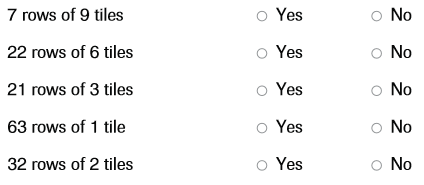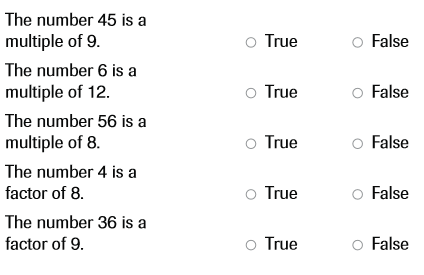What are the factors of 12?
1, 2, 3, 4, 6, and 12
What are the first 8 multiples of 3?
3,6,9,12,15,18,21,24
Is 22 divisible by 2? How do you know?
Yes, because it's an even number
Is the number 1 prime or composite?
neither
What's the next number in the pattern:
6, 8, 10, 12, _____
14
What are the factors of 60?
1,2,3,4,6,10,15,20,30,60
What are the first 10 multiples of 8?
8,16,24,32,40,48,56,64,72,80
Is 56 a multiple of 9? Use divisibility rules or basic fact knowledge to help figure this out.
No, because 5 + 6 = 11 and 11 is not divisible by 9.
Is the number 18 prime or composite? What are the factors?
composite: 1,2,3,6,9,18
List the first 8 numbers in the pattern.
Rule: Add 4
First Number: 12
12, 16, 20, 24, 28, 32, 36, 40
E'Mariya was decorating her room. She arranged 63 picture tiles on a wall in the shape of a rectangle. Choose Yes or No to tell whether a possible arrangement of the picture tiles is shown.

Y,N,Y,Y,N
What are the first eight multiples of 4?
4, 8, 12, 16, 20, 24, 28, 32
Is 60 a multiple of 5? Use divisibility rules or basic fact knowledge to help figure this out.
Yes, because 12 x 5 is 60 and 60 has a zero as it's last digit.
Is the number 51 prime or composite? What are the factors?
composite: 1,3,17,51
Create a pattern that uses the following rule:
Multiply by 3
Show the teacher your answer (there could be several answers)
Draw rectangles to show the factor pairs of 56.
I will look at your work to see how you created your rectangles.
A store in Roger’s neighborhood sells boxes of pencils that have 6 pencils in each box. Roger bought several boxes of pencils at the store. Which could be the number of pencils he bought? Mark all that apply.
A 9 B 18 C 20 D 24 E 34 F 42
B, D, and F
Classify the numbers. Some numbers may belong in more than one box.
3 & 9: 45, 81,99
5 & 9: 45
2 & 6: 48, 84
Is the number 79 prime or composite? What are the factors?
prime: 1,79
What are the missing numbers? What is the rule in the pattern?
5, 8, 16, 19, ___, 41, 82, ___, 170
38 and 85
Your art teacher wants to organize 16 paintings into a rectangular array on a wall. How many different arrays can she make?
1 x 16
16 x 1
4 x 4
8 x 2
2 x 8
She can make 5 different arrays.You plant 9 rows of different bulbs in a garden. For ech row, you use the rule, "onion, onion, garlic, flower." How many garlic and flower bulbs do you plant altogether? How many bulbs do you use in all?
O, O, G, F 9 X 2 = 18 F and G bulbs
O, O, G, F 9 x 4 = 36 bulbs all together
O, O, G, F
O, O, G, F
O, O, G, F
O, O, G, F
O, O, G, F
O, O, G, F
O, O, G, F

T,F,T,T,F
Is the number 603 prime or composite? How do you know?
Composite: 6 + 0 + 3 = 9, so 603 can be divided by 9
Describe the pattern. What number comes next?
65, 45, 40, 20, _____
15
Subtract 20, then Subtract 5